On Saturday, Louis C.K. dropped a surprise American theatrical melodrama on all of us in the form of Horace and Pete, available, like his surprising stand-up set Louis C.K., Live at the Beacon Theater, for $5 directly from his website.
H&P is the sort of show you’ll put on out of curiosity and wonder what you’re watching and why. Louis C.K. is Horace, a single dad with an estranged adult daughter and an improbably young and attractive girlfriend. Steve Buscemi is his brother Pete, a mentally ill loner with inadequate health insurance. Together they run an old neighborhood bar in Brooklyn, where the clientele are nasty drunks and hipsters are unwelcome but arrive anyway. The conflict surround’s Edie Falco, their sister, and her imminent arrival, lawyer in tow, to sort out issues of inheritance.
The first episode is a two-act play: 67 minutes long, with an intermission, and neither funny nor fun. It’s meaningful, but mostly sad. It’s highly topical. It’s melodramatic in a dated way. It all plays like the beginning of the epic 12-part season finale of Samuel Beckett’s Bar Rescue, with John Taffer as the Godot who never arrives.
H&P makes no case for you to want to watch it. It is almost self-consciously uninterested in the opinion of the audience. It’s a take-it-or-leave-it project. That in itself is interesting. But it also places the audience in the position to set its own priorities. The 67 minutes gave me plenty of time to consider these priorities, and several answers come to mind.
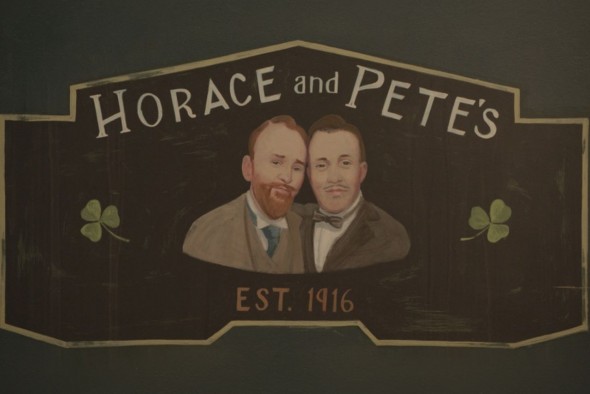
The Arrival
For starters, there’s the distribution, in the mode of Louis C.K.’s Live at the Beacon Theater stand-up set. Beacon was released in 2011 with fanfare from digital media aficionados: it was released DRM-free for download, in audio mp3s and video mp4s, easy to torrent, but with a request not to. At the time, it felt like the future. But, as Horace and Pete stresses, the future doesn’t tend to have these sorts of clean and easy breaks with the past.
Since Beacon, C.K. has sold a few more stand-up sets digitally from his website, but lately we’ve seen the more exciting growth come not in downloadable media of the sort you can own for a flat fee, but from various streaming platforms and subscription services, pointing perhaps down the line to an app economy for modular cross-platform television and movie channels.
And, we’ve seen surprise releases now quite a few times, albeit mostly in the music industry. Radiohead did it before it was cool, sort of. Beyonce made it cool, in 2013, with the full album Beyonce and a full slate of music videos. Rihanna just dropped an album by surprise last week, Anti, and even if it hadn’t had its share of problems, the thrill of the method itself is spent (if Drake is doing something, how daring can it really be?). Rihanna continued to follow in the shadow of Beyonce, which I guess is fine, because so do the rest of us. And Anti is only available on Tidal. But that’s all beside the point.
The point is the method and timing of the release of Horace and Pete, while attention-grabbing, isn’t notable. Not really. Well, maybe notable, but not special. If we’re going to care about this show, it’s going to be for a reason other than the $5 download.
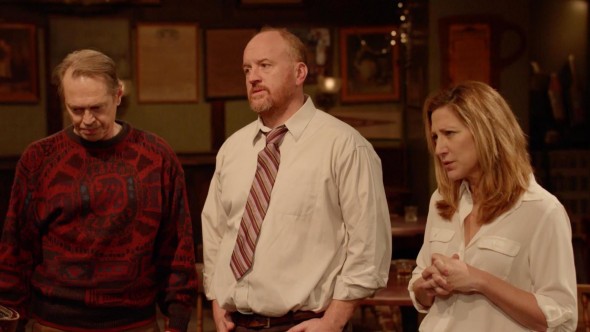
The Performances
Horace and Pete is, above all else, theatrical. It’s staged and lit like a play. The first shot is of a dark room with a single table lit for no reason. Did I see literal gaslights on the walls? With barely two sets, almost no music, plenty of silence, and about one exit for every entrance, well, you get to see some acting.
And as a play might give you two performers working in different parts of a stage, tugging your point of focus to their individual emotional journeys and choices, H&P tends to stack the depth of field with players almost in 3D, daring you to focus your attention on the background actor while the foreground actor nominally commands it. So you get to see more acting at once than you usually get to see in a TV drama, which is interesting.
And, despite some weakness in the writing, the cast is great. Louis is in his wheelhouse. The excellent Steve Buscemi outclasses Louis in every shot they’re both in. Edie Falco invests her late entrance with a credence and urgency that feels more authentic than it deserves. But the real treat is a command performance from T.V. legend Alan Alda, who plays “Uncle Pete,” a character so dated and miserable that breathing humanity and power into the work is a veritable master class.
For those of you who know him primarily from M*A*S*H or the criminally underrated Alan Alda in Scientific American Frontiers, you might not expect his entrance to herald appropriate things for this dour business. If you’ve seen his stage work (such as his Tony-nominated 2005 turn in Glengarry Glen Ross on Broadway, alongside Jeffrey Tambor and Liev Schrieber), you were probably very excited at his entrance, justifiably.
A lot of other meaningful names are attached to the project: Jessica Lange and Steven Wright, to name two who will probably see more action in later episodes, and meaningful faces: like Rebecca Hall, who’s been in nearly a dozen movies since The Town six years ago. Watching the players enter is a little thrill, and they enter like they want to stay a while.
So, in this inventory of assets, if all you want to see is great actors doing great acting in a way you don’t generally get to see these days, with plenty of patience and not a lot of aggressive editing, and on your TV at home, fork over your $5. That in itself is a pleasure.
The Uncomfortable Honesty
My favorite moment in this first episode came when the young female bar patron called out Alda’s Uncle Pete for his racism, demanding he stop his bad behavior in her presence, protesting “Why is that not an option?”
On reflection, this felt like the mission statement of our two-act play. People with bad attitudes, cruel intentions, worn prejudices, social problems, inappropriate girlfriends, why don’t they just stop? Why can’t children forgive parents? Why can’t parents stop hurting children?
And as Edie Falco arrives with the likely intent to shut down the bar, can those who will themselves not stop — the wife-beaters, the alcoholics, all the generations of abuse and hatred — be stopped by force?
The episode gives some surface-level credence to the idea that the country’s past and present prosperity owe something to old racists. It appears to pose the problem that people do not see in themselves how much they depend on and benefit from people whom they find uncomfortable.
But I think this is a relatively minor point, and that Louis C.K. is hunting bigger fish here. The racist apologists like Uncle Pete are blowhards and hypocrites who are just as quick to insult their customers in moments of disgust as they are to defend them in moments of indignation.
And all the while, the number 50 haunts the episode: you can’t do that, you’re 50. How old are you, 50? You’d think you would have accomplished more. You think you’d be more impressive.
It’s not shocking for a Louis C.K. work to be fraught with self-loathing, but I suspect that we have only begun to delve into the self-loathing in Horace and Pete, and that it will follow two truths:
The first is that our perceived ability to censor or shut out people who bother or hurt us from our social media feeds or social lives does not remove them from existence, and that our expectation that we can remove these people from our lives is delusional, because they are among our families and friends and share the world with us. Somewhere, there’s a place where we meet the people we can’t bear to be around: the basement bar, perhaps, stands in for a psychological space. Horace’s daughter speaks of a sibling who won’t even say Horace’s name, but even that does not raise hopes of changing Horace, or even of easing the sibling’s pain.
And to the extent that the episode has a resolution, it involves not a changing, but a leaving. And leaving and changing are not the same. Leaving is an option. Changing so as not to be objectionable is not.
The second is to consider if we are these people ourselves, and to consider dignity and humanity as such, and whether it is important or why. Is it an option for us to change? Many works of art would say yes. This one would seem to say no, at least so far. And perhaps our finding others so objectionable also tells us something about how we appear to others.
Think of it as the Rawlsian Veil of Assholery. If we were to consider how to organize our own government or society, we must consider the moral luck of whether we turn out to be assholes, especially if once we are assholes, we can’t be helped or changed. As such, we might consider a society that makes space for assholes, or benefits them, or treats them well, in much the same way we might consider a society that is kind to the poor or tolerant of religious and non-religious belief.
Horace was born a Horace. Pete was born a Pete. Their state of being is defined not by justice (the “common law”), but by birth (the “tradition”). They don’t want this situation and they didn’t ask for it. With the understanding that almost nobody seems to like them, and they don’t seem to deal well with most other people, how ought their bar to be dealt with? And what is it like for them to be in their 50s and not have much hope anymore of truly changing as people.
It’s a thin sort of thread, but it’s the most compelling idea I found in this first episode, and I’m curious whether it only runs through the episode as a standalone (with its mental illness requiring either medication or a locked room as a neat reminder of the essential lack of free will by humans), or whether it will serve as a larger question through the series.
Especially since, even as the characters come across as implausibly cliched for fiction, I’m not a little bit pained to say the worst behaviors they showed resonated quite a bit with people I’ve known in real life and ways I’ve been treated. I suspect I’m not the only one. It’s a place where our storytelling really does censor experience, characters like this, who do not appear to have the option to not be huge pains.
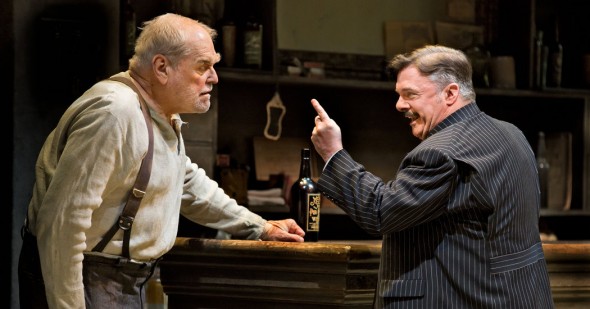
The Theatre Appeal
Another potential reason to care about Horace and Pete is its form and genre, which are not unusual ones for performing artists in America to work on, but are unusual for anybody to want to watch, especially on an electronic device.
The New York Times compared Horace and Pete to Norman Mailer, but I might as well stick to the high school curriculum and link it to Eugene O’Neil and The Iceman Cometh, a play that shares much of the setting and tone of this one, taking place in a bar full of exaggerated hard cases from a variety of walks of life. Like Iceman and the scores of plays like it, Horace and Pete is a cantankerous, sad, sometimes funny, deep, cliched, political and psycho-social investigation into Who We Are Now And What Does It Mean If We Start From the Assumption that America Broke Its Promise.
Horace and Pete is very, very similar to what has come before in this space. You may have seen extremely similar plays put on in college with the existential crises of 20-somethings taking the place of H&G’s quinquagenarians. There are a bunch of social archetypes of people who are relative disappointments to one another and absolute disappointments to themselves. Their sexual relationships never really work, nor do their friendships, nor do their families.
They share a confined space that is dim around the edges, so that you know it isn’t the walls keeping them there. It’s the theater, so you get to see their faces! Their bodies! In real clothes! Not like fancy clothes but clothes of sad people that aren’t properly fitted! They sit, and they stand, and pause, and walk around the table, and sit again, all while they talk in a pained but grand manner about matters of importance, known and unknown, about the place where they are, about politics and law, about inevitable procedural measures of this or that — letters sent and on the way, memories of childhood or war about to burst into gruesome flowering, lawyers or doctors that will show up right before you validate your parking to carry a paper or a person into or out of the wings — and it’s all related to the failure of families, businesses, nations, bars, boats, board walks, dance clubs, tree houses, childhoods, adulthoods, minds, dreams, sexualities, slip and slides, whatever else you choose to decide is the thing that everybody is sad about this time around because it isn’t as nice as it was supposed to be.
Remember, somebody at some point indoctrinated all of us: Because this is America, we’re all supposed to be happy and get everything we want: not just aspire to it, but definitely, definitely get it, to the point that if we don’t, it means utter collapse. You must disabuse yourself of this notion! You must! You must! American psychological melodrama has to keep beating that same dead horse of our supposed indoctrination with exceptionalism well after everybody else has moved past beating dead automobiles to beat dead bullet trains and hoverboards.
Like C.K.’s eponymous bar, Eugene O’Neil’s shadow, or something that looks like it, has been turning the lights on and off for the better part of a hundred years. I don’t mean to slam these masters of theatre quite so hard — you also get to connect on an emotional and psychological level with some glorious cultural stuff that might change your life — but you’d think if O’Neil knew just how Long the Day’s Journey into Night was going to be for America, he would have packed us extra sandwiches.
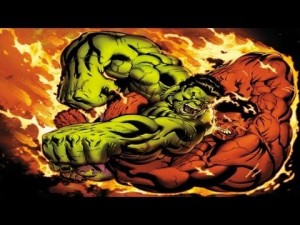
Iceman (L), Desire (R)
A Streetcar Named Desire and The Iceman Cometh came out about a year apart, in 1946 and 1947, respectively, Hulk-level thunderclaps that cracked the asphalt of the American artistic mind. Theaters and schools redo and redo and redo the best of these plays, because they are still awesome. They also redo and redo and redo lesser plays of this sort from across the 20th century, which I tend to find are usually disappointing, because the degree of mutual influence is so great that it’s hard to justify the tonal self-reverence that is usually baked into the production.
But the point is, if you’re swinging in these leagues, and you want to make a dent, you need to swing really damn hard, and probably with some sort of new techno-bat.
Does Horace and Pete swing this hard? Well, so far, no, not really. It’s fine, but it doesn’t rise above what already exists in the genre. I know real people who can’t get medication they need because of insurance, so seeing it fictionalized isn’t a huge revelation. But, it is a series, which feels a bit novel, so that impact on American theatrical legacy has yet to be determined. Let’s call it TBD.
The Pleasure Principle
The last choice that came to mind was the least likely for me: which was that you enjoyed your time watching Horace and Pete. That you found it engaging, or moving, or satisfying, or educational. For me, the watching was externally motivated. I wanted to watch it because I wanted to know about it. I was curious. I wanted to talk with others who would watch it. I wanted to be part of the conversation here on Overthinking It and elsewhere.
But I’d be curious to hear from someone who found the first episode internally pleasurable. Or at least sublime or meaningful. I’m not sure the show has the legs to quite get there, but it doesn’t owe me anything. And I am curious enough to watch it again and see where it goes (and have seen enough shows where the pilot falls far short of the general quality).
We are, after all, just getting started. And at the very worst, we can hope for more Alan Alda.
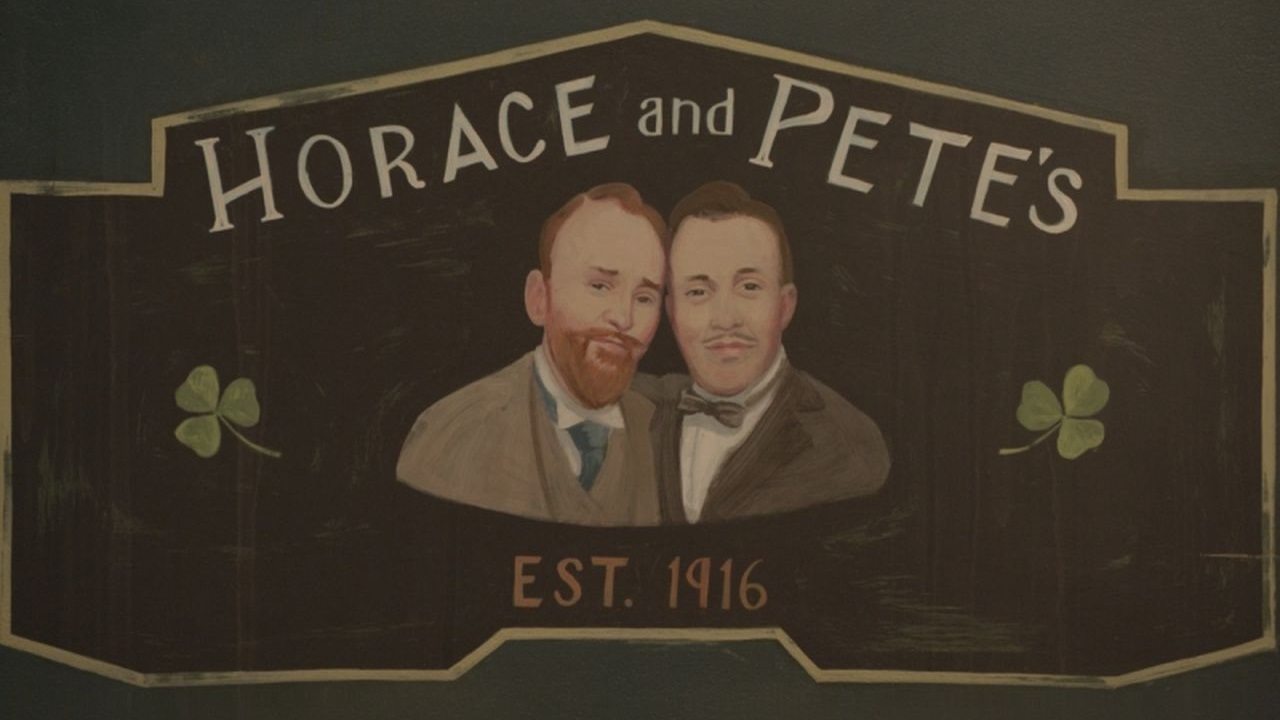
Add a Comment